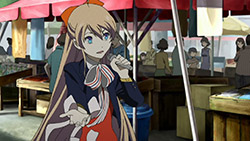 |
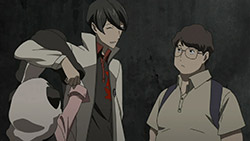 |
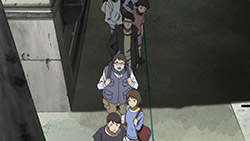 |
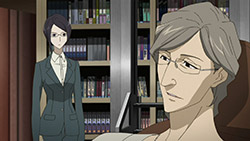 |
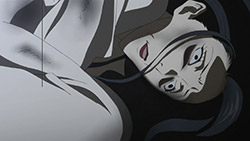 |
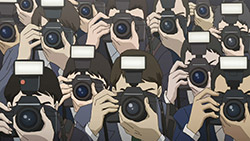 |
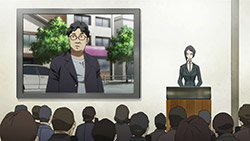 |
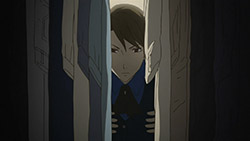 |
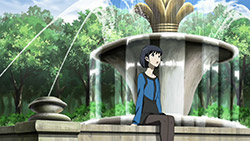 |
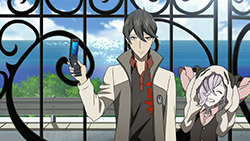 |
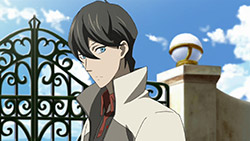 |
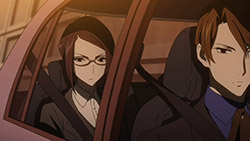 |
 |
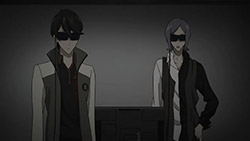 |
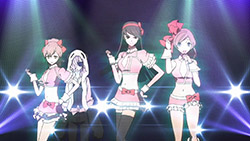 |
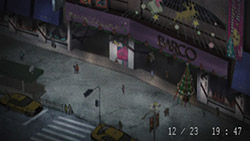 |
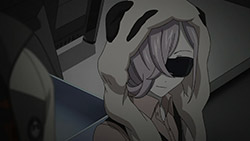 |
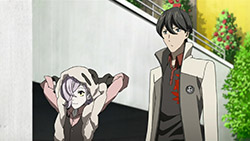 |
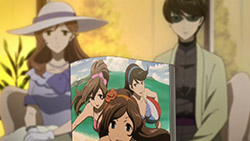 |
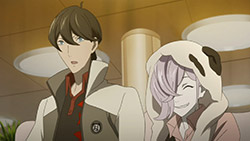 |
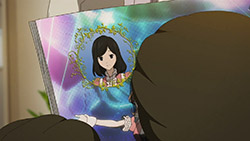 |
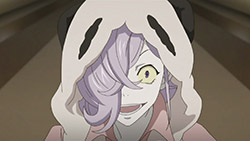 |
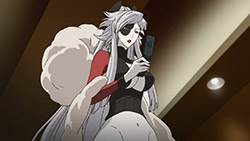 |
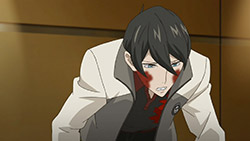 |
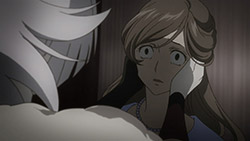 |
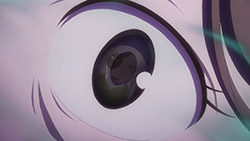 |
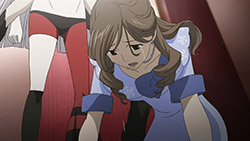 |
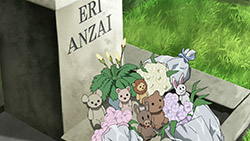 |
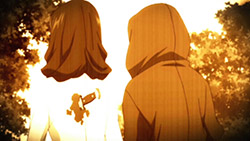 |
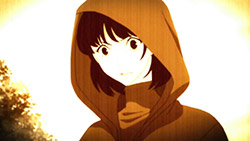 |
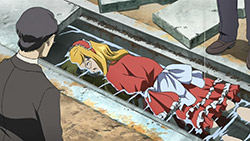 |
 |
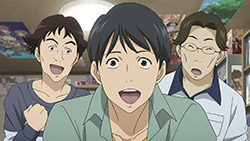 |
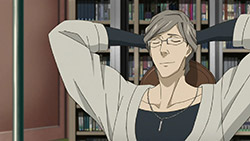 |
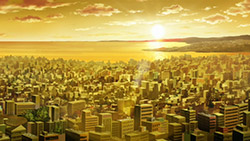 |
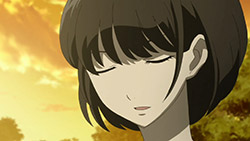 |
「無情のうた」 (Mujō no Uta)
“Pitiless Song”
If the measure of a second episode is to be better than the first, then this week’s UN-GO certainly passed the test. What it didn’t do is finish the job of convincing me that this is going to be a compelling series.
There are some interesting trends in anime this year, and some of them are showing themselves in UN-GO. We’ve obviously had a rash of episodic detective shows, and we’ve also seen quite a few series grope with the subject of domestic terrorism and a general sense of powerlessness as it relates to Japanese society. We’re seeing both those themes pop up in both halves of the NoitaminA block. Does this represent a sort of national malaise where the Japanese people are feeling threatened by increasing internationalism? That seems to be a growing political trend everywhere, and it’s certainly the backbone of Ishihara Shintaro’s xenophobic political movement in Tokyo. Of course it could all be coincidental, but it’s an interesting question to ponder.
As for detective series, what I take from that is a hunger for nostalgia, because there’s nothing more traditional than the detective yarn. In many cases the nostalgia is literal, as shows like Gosick and Dantalian are set in the years before WW II. The irony for me is that while UN-GO is set in the future, in terms of structure it’s actually the most traditional detective series of the lot, despite the surrealism surrounding Inga and the technological trappings. This is a story written in the 1940’s and while BONES has given it a new suit of clothes, the essence of the source material still shines through. If it reminds me of any of those earlier detective anime from this season it would be Dantalian, with its chilly emotional palette and hints of mysticism.
UN-GO may suffer from some of the same problems that Dantalian did too – a lack of overriding story and an inability to form a deep emotional connection – but it’s too early to tell. The mystery was certainly far better than in the premiere this week, and the pacing and direction was far better too. I especially enjoyed the whimsical POV shifts as the facts of the case were being played out near the beginning of the episode. The story superficially surrounds “Dol-lpli” or voice idols – “not like that ancient Vocaloid thing”. They’re a kind of cutting edge VR evolution of the idol industry (one which one suspects may not be all that far off even as we speak) and they’re connected to the murder of an agency executive, Osada Hisako (Matsuzawa Chiaki).
The mystery that follows is interesting and well-crafted by the standards we’ve seen in anime, 2011. The reclusive genius Rinroku crafts a theory that blames the victim’s transvestite lover, and a trail leads Shinjuro and Inga straight to two members of the disbanded idol act Yonagahime. But the truth lies at the feet of the victim’s daughter, frustrated singer An (Yasuno Kiyono). The human drama here is relatively interesting, but – and this is clearly the pattern – it’s really a sideshow to the main event, which is a kind of dystopian idea control that Rinroku and the prosecutor Koyami Izumo are up to their necks in. We have a national tragedy (“The attacks of 12/23”) being exploited for propaganda, and used as an excuse to trim individual rights. This appears to be our recurring storyline – Shinjuro’s quest for the truth, always to be thwarted by the propaganda machine run by the alarmingly fascist central government. There’s serious potential there – but will it get tiresome to see the same ending to every mystery, if indeed we do?
Based on premise alone, I think we’re seeing the makings of something pretty interesting here – a story that was written during the halcyon days of fascism being adapted for the Ishihara era (“Internet Information Privacy and Protection Act”, anyone?). I’m still not sold on the characters though. The government dogs are sock puppets for now, though we may see them fleshed out later. Shinjuro is something of a loser, to be honest – waiting in line to buy software to earn extra cash and always being foiled when he discovers the truth of a case. I don’t doubt he’s smart, but what’s his motivation to keep going through that? What is he passionate about – or is he passionate about anything? He seems to take the suppression of the truth that ends his cases pretty stoically, at least so far.
And then there’s Inga, still the wild card in this deck, seemingly the MacGuffin of this series. Our hint this week was Shinjuro’s comments about promising to show Inga “what a real human is. Real human truth.” Of course we fundamentally don’t know what Inga is, though “human” is pretty far down the list of possibilities. Of more practical concern is whether Inga is a good character, and the jury is still out on that. The female form – his “demon” side, for lack of more definitive information – is actually sort of scary and unpleasant. Fortunately the child form is more agreeable and certainly cute, though we haven’t really gotten past the mugging for the camera phase yet. Between Inga and Shinjuro, whether they break out as characters will determine how far UN-GO can go as a series.
Preview
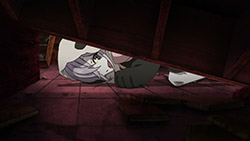 |
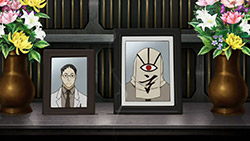 |
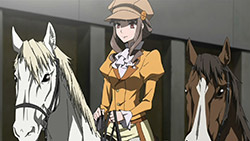 |

“not like that ancient Vocaloid thing”” Lol!
I still think the mystery is lacking. Inga’s question was quite pointless and only really confirmed Shinjuro’s hunch. All would have been revealed by guilt-tripping the daughter.
Rinroku continues to be bureaucratically evil. It’s really quite criminal how he fashions some stupid theory out of some circumstantial evidence, blames everything on a crossdresser and the entire police department accepts it without a doubt. Of course the police are always wrong in any detective show, but this just seems unrealistic.
And wrong in real life, too.
Maybe you missed the part where he’s a powerful bureaucrat that has connections all over Japan, in particular the government investigation department.
This guy controls the police. Or at least the guys he’s advising do.
This anime is interesting, it’s quite okay plot-wise but it’s hard for me to “feel” the show. I had a hard time concentrating through the episode and had to rewatch it to understand the mystery.
I kinda feel like this show lacks the ability to make the viewers enthusiastic about this show. But that doesn’t mean it’s a bad show. I just think it’s a bit slow. Nowhere near dropping though. I think KamiMemo was waay more boring than this and I still finished that show.
…I still don’t know what to make of this series. Is it going the Conan route with an overarching goal or is it just episodic? Part of me wants everything that happens or will happen to be connected in some convoluted way a la Durarara, but the other part is afraid this’ll end up as a bunch of unrelated cases.
And has anyone read Ango Sakaguchi’s Meiji Kaika Ango Torimono-chō (the source material)? Considering it’s a postwar novel, we can probably find a bunch of similar themes in Un-Go and postwar Japan. Such as…
Show Spoiler ▼
I can hear the collective groan… But I would personally love this if it happens.
From crime show to political drama.
That’s basically what I said this show was all about right from the start. UN-GO is a mystery/political intrigue series; essentially a political commentary, in the same vein as its source material. And while this second episode was certainly less than compelling, its writing was still significantly more competent than that of the first- the mystery’s resolution actually had a sense of naturalness to it in comparison.
But BONES having (at least) competently produced this second episode does nothing to quell my concerns about the future of UN-GO; specifically that of its climax. As I’ve mentioned before, UN-GO as a show is all about weaving political intrigue/conspiracy into mysteries; that’s its niche. Through the first episode the writers of the show have proven that they have a hard time coming up with seamless political mysteries whenever the stakes are high; e.g. inserting the backdrop of the world into a single mystery- their attempt at this was far from seamless.
And “high stakes” can hardly be used to describe the second episode/case arc of a mystery series; after the exposition mystery usually comes a calm, where the producers will aim to ease viewers into the story. Therefore there was no need to weave any excessively complicated overarching political concepts into this week’s mystery- and partially due to this fact, no doubt- the writers managed present us with this (at least) competently produced episode where the stitches connecting the mystery and the political element behind it are far less frayed.
So it should come as no surprise that this week’s episode does little to nothing to boost my confidence in UN-GO’s writers’ ability to work with complex political issues. When faced with a complicated premise like that of episode one, they failed to come up with a seamless political mystery; whereas they were only able to produce a competent yet uncompelling second episode centered around a simpler premise. The fact that they are essentially popular entertainment writers who most likely have little experience in dealing with complex political commentary also inspires little confidence…
What I predict at this point in time, (subject to change, as the information available to me changes) is that we will probably have many competently produced stand-alone political mysteries for the rest of UN-GO, and maybe even several that are also compelling. But when this show reaches its climax (or perhaps some kind of high mid-point), this is where my concerns start to kick in. Such important plot points will almost certainly require that complicated political issues be woven into the mysteries surrounding them- and the writers at BONES have shown to me through the first episode that they just might not be up to the job. I want to be wrong about their abilities more than anything, but I have to say that they’ve done very little to prove otherwise this week…
If the producers of this show at all intend to place UN-GO’s heroes at the center of some kind of major political intrigue/movement/unrest/revolution??? over the course of this show, then they had better get their writers to up their game, fast. The show is doing alright now, but we will eventually arrive at a point in time when their abilities will be put to the real test. Otherwise, I think UN-GO would be better served by sticking to an episodic Dantalian-like formula which doesn’t focus on an overarching story; that should be the safest, if unspectacular way to play their cards…
While I agree that we haven’t yet seen the hard evidence that the series is up to the serious challenge of trying to be a complex political commentary hidden inside a mystery, I think you dismiss them as “popular entertainment writers” a little too easily. Aikawa Shou is a very, very talented adapter of material. If you look at the shows he’s written – Oh! Edo Rocket, Twelve Kingdoms, much of the FMA catalog – he’s worked with some pretty complex material by anime standards. This is not a hack, and neither is Mizushima, the director. They’re both among the top echelon of creative talent in the industry and that’s what gives me hope that they might rise to the occasion.
Lol, I knew you were going to call me out on that one- I almost didn’t put it in. 😉
I’ll be the first to admit that I know little about the backgrounds of the staff responsible for the production of UN-GO, and I must say that it does inspire a significant amount of added confidence in me now that I know that several of the show’s senior production staff come from such illustrious career pedigrees.
Yet I cannot overlook present performance simply because these people have done so well in the past- the fact of the matter is that the first episode wasn’t too great, and this second one was merely adequate. And whatever the pedigree of the top brass may be, many of the lower-ranking staff members may still lack the requisite experience.
And creating a good political commentary show is hard; not in the least due to fact that real-world politics tends to be a lot more complicated and nuanced than TV may have us believe. A deeper understanding of political mechanics is often required in order to craft a story which truly resonates with the issues behind it. One of the reasons why anime and manga so often resort to using monarchies as their fictional government is for simplicity’s sake- modern liberal democracies are simply too complex; it is nigh impossible to represent them in a deep and meaningful way without a half-decent understanding of how they work- something that many in the entertainment industry, no matter how talented, lack- yet I would not be surprised if these excellent people that you mentioned actually do fulfill this requirement.
Sakaguchi Ango was a man who had an intricate understanding of politics. He was a prominent Japanese philosopher and political thinker of his time. I have not read his works, but I would imagine that they are not vastly different from the works of the various Western philosophers and political thinkers that I have read in terms of depth and complexity (And I am comparing no other aspect here).
And therein lays the problem- how do you represent complex political ideas in a simple, easily accessible manner that is befitting of a mainstream anime series; in a way that everyone would be able to understand, and yet have it remain engaging? This seems to be the primary problem that’s been plaguing UN-GO. Even assuming that the production team understands the political issues at hand perfectly- they must still face the greater challenge of presenting them to an audience in a simple yet engaging manner- which is a daunting task indeed, and I attribute any level of competence at all to the stellar pedigree of the team’s top brass.
I can’t express how much I want this show to be amazing, because it isn’t often (like almost never) that we get a mainstream anime that is also a political commentary. But (mainstream mystery/political commentary) is just such a niche and underdeveloped genre, with little guiding precedent about how to do it right- so I can’t help but worry…
What’s going on with this series and Guilty Crown? I know little about what’s going on in Japan currently but is there some big stink about globalization going on in that country?
It feels like both series come from the viewpoint of Japan’s version of the Tea party movement with intense xenophobia and nationalism while playing the victim of some Western fascist government. Seriously, it feels like someone took the plot of Red Dawn or Modern Warfare 2 and switched the US for Japan and Russia for the US.
Someone please tell me this impression’s wrong, cause if I’m right then a chunk Japan’s anime studio’s have serious blood clots in their collective brains.
Google Ishihara Shintaro and you’ll get a pretty good idea of what the tea party element is like in Japan. I don’t consider Noda and the DPJ to be especially xenophobic, but Ishihara’s view has a lot of support.
Luxor, I definitely think this is headed for bigger things with the dystopian plot – that will supersede the mystery of the week.
😯
So I looked him up, and I must say that this Ishihara Shintaro is quite the controversial character (So says Wikipedia XP). He called the Nanking Massacre “A fiction of propaganda” and said that the 2011 Touhoku earthquake was “divine punishment”- completely apalling. This guy’s like an Arab bigot and an extreme Pentecostal preacher all rolled into one…and he’s actually popular?!? I’m aghast…
Hoping this dystopian plot kind of takes over the rest of the series as we get further and further into the episodes. The mysteries are okay though it’s kind of sad that 2/2 times so far, I could easily tell who the criminal was, the second one with the motive included. (The first one was too vague.)
I’m really not sure what xenophobia or Ishihara have to do with these plots, but I do think there is a certain level of awareness that the global economy is imploding, the national governments are helpless and just keep printing money, and we aren’t getting any answers other than excuses and political gridlock. If that’s the intent of these ‘xenophobic’ or world-issue tie-in shows, then I have no objection.
As far as I can see the problems affecting Japan are pretty much the same globally, in that we need a move toward anarchism if there is any chance of surviving the next financial calamity.
As for the show itself, I thought it was once again a bit too frenetic. I can’t keep up with so many cuts and pasting of names on screen, how would anyone watch this without a pause button? Relatively entertaining show, but the characters feel kind of paper thin and the whole thing feels like a fashion show, a la Guilty Crown.
dropped
Most interesting show this season and there’s a lot of good stuff for fall. Hopefully BONES can keep up the quality and not screw up the finale like they always do. Hopefully.
Wow, I just love how this show encourages (open) discourse on issues mentioned in the above comments. This alone makes me want to continue watching this series and discover how one (or most? Or all?) Japanese view certain aspects of “real” life. And how other viewers from other cultures see it. These are the kinds of shows that I really enjoy. It makes me evaluate my own beliefs.
Or maybe I was just out of the discussion most of the time. XD
I really just wonder that with people knowing the issues, are they committed to do something about it? (That sounds so Anime, and right now…that is Guilty Crown). And now I think UN-GO and Guilty Crown go well together.
Or is it just this group of people? XD
Anyway, I just find this show to be more daring in showing (one of its) message(s) – the ambiguities of (political) decisions.
And my advice to Shinjuro:
“Nothing is true. Everything is permitted.” – AC
@JD – Yes, I do think it speaks highly of UN-GO that is spawns discussions of this nature. It’s the exact opposite of GC in some ways (though both are anti-internationalist), because this is a show that’s struggling in execution but trying to spin a complex and interesting commentary. GC is completely derivative light entertainment that looks and sounds absolutely spectacular and begs you to turn your higher brain functions off and just have a great time with a little bit of drool running from the corner of your mouth.
@Zen – Yes, Ishihara is very controversial. He’s most controversial in anime circles because of “Bill 156”, which the LDP is currently trying to duplicate at the national level. He’s been in power in Tokyo for quite a long time but his message seems perfectly tailored for these times, with faith in global capitalism at a low ebb (justifiably, in some ways) though I think Ishihara’s core message is less anti-capitalist (he’s actually an economic conservative) and more about racial purity and returning Japan to the days before the black ships came.
I also found it interesting how Shinjuro contrasts with Shuu, the former as the one who seeks the truth and the latter the one who escapes from it (well, at least initially). I have been watching the two back-to-back, and maybe I’m just looking in too deep. XD
We’ve obviously had a rash of episodic detective shows, and we’ve also seen quite a few series grope with the subject of domestic terrorism and a general sense of powerlessness as it relates to Japanese society. We’re seeing both those themes pop up in both halves of the NoitaminA block. Does this represent a sort of national malaise where the Japanese people are feeling threatened by increasing internationalism?
Yes, but it’s not “increasing internationalism”. It’s a much deeper problem that has plagued Japan ever since the US Occupation at the end of WW2, and has to do with their inability to truly be independent of the US, and also to deal with lingering problems from the war, especially vis-a-vis China. (Most people focus on the economic miracle etc, but the reality felt in Japan, especially after 2 decades of economic stagnation, is really different. Politically, they’ve generally been forced to listen to what the US wants them to do.)
What you’re describing is true, but has always been an important elements in Japanese society since the war. It doesn’t address the question as to why there seems to be an uptick in the role it’s playing in anime as of late. There have always been anime that dealt with the struggle between the national identity and international (especially American) influence, but not in the numbers we’re seeing this year.
“As of late”? How recent do you mean? Do you have a comprehensive list of all the series (or other media) that deal with the theme of (weak) Japanese national identity over the last decade (or more)? Code Geass, Higashi no Eden, Guilty Crown…what else is there? Ah, Battle Royale (1999). I’m sure there are more, so if you’re talking just about this year, I’m inclined to go for ‘coincidence’ – do remember that ideas generally take a few years to develop – it’s not like they plan for things to come out at the same time.
As for explanations, globalization (or what you’ve called ‘internationalism’) is just a small part of it – I’d say it’s more a matter of pride and status. Foreign products have permeated the Japanese market for a long long time, so why are they feeling threatened only over the last decade or so? I’d argue that the issues of national identity have been growing in salience over the last 20 years or so in Japanese politics and society, with the most important factors being Japanese stagnation, China’s growth, and even the fact that the attention of the US was arguably being drawn away from Asia after the end of the Cold War… We probably wouldn’t be seeing as many of the above-mentioned series if Japan was doing well. That’s why I said it’s not ‘increasing internationalism’.
But I’m not going to be able to distil a semester-long course into just one or two paragraphs.
@karice67
I actually do think Japanese national identity as one of the “stronger” ones. Faltering, yes. But definitely not “weak” – especially when compared to other nations. (and while Japan is struggling with that, what now of those other nations?)
But yes, it is likely to be just coincidence. They could have a stack of anime productions in the shelves and these shows are those that fit the bill for this season. But, unless they’re a bunch of ignorant media people, I’m sure they know the subtext of the stuff they’re airing. Add to the fact that UN-GO seems to be less subtle than the others (the one’s I have watched, at least.
@JD
I have to disagree with the idea that Japan has a “strong” national identity. Try googling ‘Japan national identity crisis’ and see what you get. Or if you know enough people of a few different nationalities, try asking them questions along them lines of “What does it mean to be American?” “What does it mean to be Japanese?” etc. I’d wager that you’d get a similar response from all people who are Americans, another for all who are e.g. Australians, another for all who are Chinese and for quite a few other people. Out of all the major developed countries (and I know China is both developed and developing, but putting that aside), Japan is where you’d get the greatest range of responses – if you can even get them to respond in the first place.
p.s. Ishihara Shintarou and his fellow neo-conservatives represent just a small (albeit growing) proportion of the Japanese people. The vast majority arguably have very little sense of what makes them a ‘nation’ anymore, which is precisely why the neo-con faction has been gaining strength over the last twenty years.
Pretty boring series. Until to now we got two random, irrelevant and uninteresting cases. It’s not like Kami-sama no Memochou, in which the cases helped to develop the characters and all that good stuff.
Here is just: find a case, solve the mystery, move on, who cares…
And everything else in this show is kind of underwhelming…
Gonna watch one more episode to see if it’s worth it or not.
Wow, some deep discussion going on here 😉
I just needed to comment that the OP/ED are absolutely great! School Food Punishment’s OP has the near same ending as their ED for Higashi No Eden which just set off alarm bells as soon as I listened to it.
Definitely a series I’m going to be sticking with, I hope it doesn’t crash and turn out to be mediocre all the way through and not actually do anything worth-watching like those animes you see every season with interesting settings but not enough money/enthusiasm to do something with it.
Did anyone else absolutely fall in love with that Yokohama song? >< it's completely stuck in my head!
SO…… Call me simpleminded but Im more interested in the relationship between Inga and the defeated detective.
First ep, I thought they had like platonic, we get romantic occasionally but no big deal boss/employee type thing.
NOw it seems like he’s stuck to her due to a promise he made about showing her the “human truth”.
It seems she can kill him easily too and he has some fear of her. Im not sure if the demon side sees him as a disposable person or not.
THats my main interest and hope we get some fleshy-out-ness instead of random case of the week.
I suppose that would be revealed in “UN-GO Episode 0: Inga-ron” showing in theaters in Japan on 19 November.
I assume Inga saved(?) a dying Yuuki during the scene (earthquake? terror attack?) shown in episode one.
That scene is just so mysterious and that girl that gasped is shown in the ED too, with flames.
From the OP and ED several characters have yet to appear.
Guardian Enzo, good point in comparing the atmosphere of this show with Dantalian’s! I pretty much liked Dantalian despite its many weaknesses. Quite often it was anticlimactic and the mysteries were rather ridiculous. The whole atmosphere was static and a bit melancholic. But that was exactly what I liked!
The same has been true for UN-GO so far: We know beforehand that it won’t change a thing if the mystery is solved. This takes out a lot of suspense and – together with the memories of wartimes always in the background – makes the atmosphere somewhat cold but also melancholic.
Due to the lack of suspense for me both Dantalian and UN-GO (as far as I’ve seen from the latter) are almost some sort of retro slice-of-life series, like Allison x Lillia but a bit darker. The movie Jin-Roh also comes to my mind (which still is a lot darker).
At first I wasn’t sure if I’d like this show because Inga is a boy and a quite annoying one at that. But now I find that there are enough cute girls in gorgeous costumes to look forward to – cf. this and this ! Presently, UN-GO is one of my favourites this season.
Honestly, this show is not impressing me. GOSICK was better as a mystery show than this. Mysteries here are just too easy to solve and it relies on a lot of copouts. For example, the whole “war” that is alluded to is never given a proper explanation and is used as the motive behind all of the mysteries so far. It’s assumed that a war is the cause of the current situation in Japan, but why is it so vaguely explored that it seems to be referred to only as a primary factor of a case? What was the trigger in the embezzlement accusations and murder in episode 1? The war. What was the reason for the culprit to do what she did? The war. This is lazy writing in my view.
I can see the sequential pattern in the narrative: Shinjurou and Inga comes across a case, the culprit is introduced as a pseudo-suspect, interrogations occur, Inga uses her truth spell, the culprit is revealed, and the premises for the case is revealed (i.e. the war). I don’t think I’m missing anything by not watching the series anymore IMHO… although I’m curious to know why the hell is Shinjurou working for Inga in the first place.
One last thing to opine before I end my little post: BONES has REALLY lost its groove with making good anime, so I don’t know why people gush over them anymore. I cannot remember a single good title since FMA:B that BONES has produced, and I know people are going to tell me GOSICK was good, but that’s only because it managed to save itself with an intricate plot in the second half. Other than that, it’s very difficult to remember a recent BONES anime that was genuinely good. Also I’m not a huge fan of their latest animations style; I don’t know why, but the best reason I can give is that everything looks too polished. That is to say, everyone in the anime have the same general design and look (e.g. Shinjurou looks like Dominic from Eureka Seven and Hei from Darker than Black), and hell even the OP looks like a DtB reject. If anything, the only good thing synonymous with BONES is production values, for which I can see in this show.
tl;dr: show’s boring, no plot, mysteries are hackneyed. Not following this.